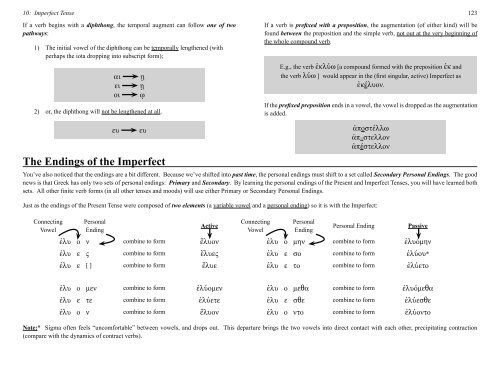Elementary New Testament Greek, 2014a
Elementary New Testament Greek, 2014a
Elementary New Testament Greek, 2014a
You also want an ePaper? Increase the reach of your titles
YUMPU automatically turns print PDFs into web optimized ePapers that Google loves.
10: Imperfect Tense<br />
If a verb begins with a diphthong, the temporal augment can follow one of two<br />
pathways:<br />
1) The initial vowel of the diphthong can be temporally lengthened (with<br />
perhaps the iota dropping into subscript form);<br />
<br />
<br />
<br />
2) or, the diphthong will not be lengthened at all.<br />
123<br />
If a verb is prexed with a preposition, the augmentation (of either kind) will be<br />
found between the preposition and the simple verb, not out at the very beginning of<br />
the whole compound verb.<br />
E.g., the verb [a compound formed with the preposition and<br />
the verb ] would appear in the (rst singular, active) Imperfect as<br />
.<br />
If the prexed preposition ends in a vowel, the vowel is dropped as the augmentation<br />
is added.<br />
<br />
The Endings of the Imperfect<br />
<br />
–<br />
<br />
You’ve also noticed that the endings are a bit different. Because we’ve shifted into past time, the personal endings must shift to a set called Secondary Personal Endings. The good<br />
news is that <strong>Greek</strong> has only two sets of personal endings: Primary and Secondary. By learning the personal endings of the Present and Imperfect Tenses, you will have learned both<br />
sets. All other nite verb forms (in all other tenses and moods) will use either Primary or Secondary Personal Endings.<br />
Just as the endings of the Present Tense were composed of two elements (a variable vowel and a personal ending) so it is with the Imperfect:<br />
Connecting<br />
Vowel<br />
Personal<br />
Ending<br />
Active<br />
Connecting<br />
Vowel<br />
Personal<br />
Ending<br />
Personal Ending<br />
Passive<br />
combine to form μ combine to form μ<br />
combine to form combine to form *<br />
[ ] combine to form combine to form <br />
μ combine to form μ μ combine to form μ<br />
combine to form combine to form <br />
combine to form combine to form <br />
Note:* Sigma often feels “uncomfortable” between vowels, and drops out. This departure brings the two vowels into direct contact with each other, precipitating contraction<br />
(compare with the dynamics of contract verbs).


















